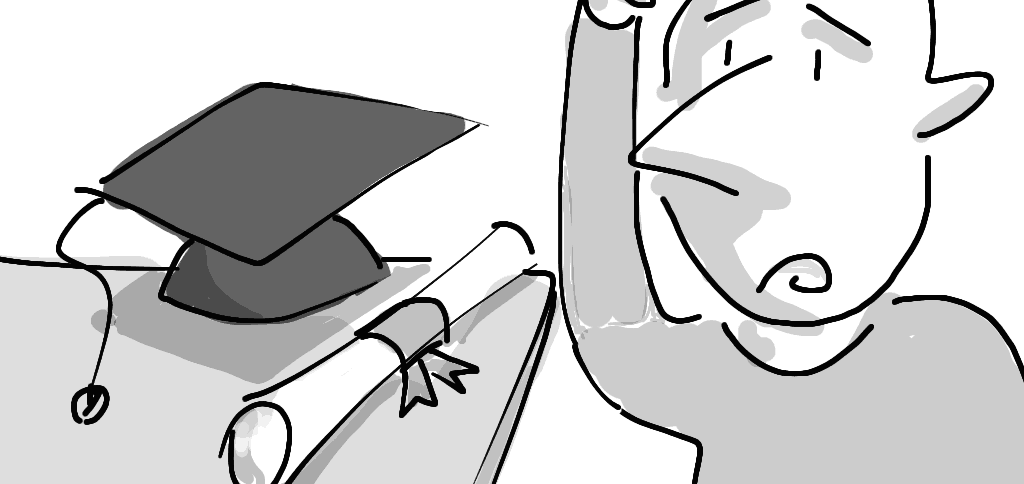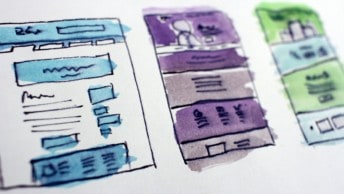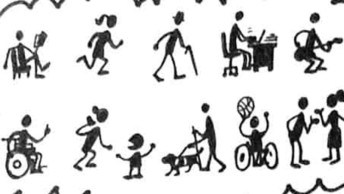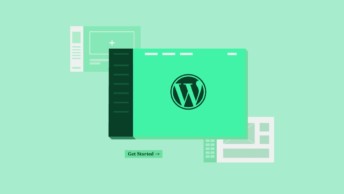We love getting email from our readers, and do our best to answer everything that comes in.
Realising that some of these conversations would probably be useful for other people as well, we thought we’d share some of our responses to reader questions on the blog—with the permission of the person asking the question, of course.
Justin from Boston, Massachusetts writes:
I am very interested in a career in UX Design. I will be graduating with a business management degree from Northeastern University this year. I have read that UX Design has a “low barrier to entry.” Would it be possible for me to enter the field of UX Design with simply a business management bachelor’s degree?
Also, Northeastern offers a graduate certificate in User Interface Design. Would something like that be recommended to improve my chances of landing a job and helping me build a portfolio?
Sincerely,
Justin
Thanks for writing in Justin.
Firstly, I had a chuckle at the fact that you used the phrase “low barrier of entry”, because that’s exactly the phrase we used when we created our What the @#$% is UX Design? video (which, incidentally, has amassed well over 50,000 views on YouTube). Given the vast body of knowledge that falls under the UX umbrella, and the hurdles that some graduates hit when applying for a job as a UX Designer, it’s only fair that I elaborate what I meant by this, so thanks for the prompt.
Low Barrier Of Entry … From Where?
UX Design has a low barrier of entry for someone who has some experience working on a software project (web, mobile, desktop, or something else). If you’re currently employed as a developer, a visual designer, a project manager, a digital producer, an online marketer, a content manager, or some other role that has you involved, even to a small degree, in creating software, then it’s very easy to move across—any of these roles would serve you well should you choose to pursue a career in UX Design. The UX Designer is probably the ultimate “generalist” role, as it requires you to understand and apply skills that fall into all of these categories.
Aside from already being familiar with much of the terminology, the biggest reason it’s so easy to move to UX Design from another software-related role is you have access to a real project that you can use to gain experience in applying UX techniques, either formally or on the sly. The most obvious technique to start with is user testing the code that you’ve written/designed/project managed. Basic user testing can be performed by anyone, using inexpensive tools and a little preparation.
What If I Don’t Have Any Experience?
It’s all very well for those of us who are already working close to the field to make the leap—but what about newcomers? What’s the best path for high school students, university students, and recent graduates to follow?
This is a little trickier, and it’s a point that Luke and I agreed to disagree on when we were asked this question in our recent Q&A webinar. Luke recommended that there would be value in obtaining tertiary education in a field related to UX Design—whether that be a degree in Interaction Design, Human-Computer Interaction, or similar.
Personally, I’d rather take three years of industry experience over three years of (very expensive) study. Having a tertiary degree under your belt is useful in many ways, regardless of what it’s in, but it doesn’t really matter whether it’s a Bachelor of Computer Science or a Bachelor of Business. Your university years are a time to form precious memories, so make that degree be about something you love.
One exception to this, for me, is in the field of visual design: Take that Graduate Certificate in User Interface Design, Justin. UX is not the same as UI, but acquiring solid visual design skills will always set you apart from other UX Designers who are great researchers and communicators, but can’t articulate their vision in a visual manner.
The Search For The Elusive Perfect Role
“That’s all well and good, Matt, but how do I get a job as a UX Designer?” I hear you ask.
Well, you don’t.
Let me explain: graduate UX Designer jobs generally don’t exist, for the pure fact that generalists with some experience under the belt are best suited for UX Design roles. Don’t get disheartened though—you should instead aim to land a job that gets you closer to the end goal—for instance, one of the roles listed previously, as a software tester, a project assistant, an intern visual designer … any opportunity to work on a software project in some capacity, large or small.
And how do you get that job?
Well, the answer to that question is pretty much the same, regardless of the industry you’re looking at breaking into: network, network, network. Be passionate. Have a side-project. Start a blog. Donate your time to a not-for-profit project. I’ve elaborated on these steps and others that worked for me in my article, How To Get Started In UX Design.
One important point to make, however, is: don’t expect to land your dream job right off the bat. It’s possible that the reason you’re drawn to UX Design is because you’re fascinated by user research, and would love to specialise in this area. Have patience. Exclusive “UX Researcher” roles are largely non-existent, and certainly rarely advertised. Be prepared to “pay your dues” as a generalist: create a ton of prototypes, facilitate more user testing sessions than you ever thought possible, work on your communication skills, learn how to write some basic HTML and CSS, watch how people behave, read up on web analytics and become familiar with Photoshop.
Then, once you’ve acquired an appreciation for the field and a set of core skills that make you a flexible and well-rounded employee, then you should start to specialise in whatever area it is that interests you.
You just may find that, by the time you get there, your goals have changed. The beautiful thing about the UX Design world is: there are always plenty of new and interesting areas to explore.
I hope that helps, Justin, and anyone else who falls into the same boat!








Thanks for the great article! :) I’m a recent graduate with a passion for design and the digital world with no intention of committing to any specific field. UX design seems to combine all the different fields I enjoy, but it has proved difficult to enter with my limited experience. Your article has helped a lot! With an expensive and useless student loan to pay off, I am planning on building my experience and portfolio for a UX career through freelancing and self learning. It’s great to have a long term goal to work towards, and as you’ve said, the digital world is evolving so fast that there might even be something new to explore by the time I’ve reached it!
My pleasure, Anneke. Glad it was helpful—keep us posted on your journey!
I’m in the exact same boat as Anneke and I have to say, this website and your articles are phenomenal for beginners like me. THANK YOU!!
You’re welcome Sam!
Hi Matthew, thanks for this great resource. I am a graphic designer considering a move into UI and/or UX design. I really like the way you explain the field, your viewpoint really reasonates.
Glad to hear it Jane! Be sure to join our community forums too—it’s a great resource for getting help on everything from how to do design to how to manage your career and everything in between. Cheers!
Hi
I am working as UX designer and analyst. I have knowledge of HTML, CSS and bootstrap. But I have interest in UX design rather than UI design. I am confused over the growth of UX Design in market. Can I make my career in UX design and Is there good growth in UX Design?
You shouldn’t follow anything for a career purely because it’s perceived to have “good growth”. UX design is a vast field, and there are many different ways that someone with UX skills can find rewarding, exciting, well-paid work, in a range of industries.
I recommend you pick up a copy of our ebook, which will help you work out which steps to follow in order to forge a successful long-term career.
Thank you for this article!
You guys are really helpful, will subscribe to the newsletter.
You’re very welcome, Will. =)
Amazing article, thank you for sharing!
Thank you for the article!
Out of curiosity, when you mention getting a UI design certificate, would you recommend getting it online? If so, do you have any recommendations where to take them? (e.g. coursera, lynda, etc.?)
Thanks so much!
Thanks Jessica, I’m glad it was useful. =)
There are a bunch of online courses (for UI as well as other UX-related areas) listed on the site, some we have reviewed, some not yet. Online courses can certainly deliver quality and value if you get the right teacher. You can see them here: https://uxmastery.com/resources/ux-courses/
Thanks for the article! I am a current high school student and I’m having trouble finding any university that offers a bachelor in HCI…they are mostly master degrees. Are there any majors that are similar and are commonly accepted for UX careers? Thanks so much!
Hi Jasmine! Any degree that gives you real insights and practical experience in UX will be good (usually by involving teachers or guest lecturers from industry), so look for ones with names like ‘Digital Design’, ‘Interaction Design’, ‘Experience Design’, ‘Human Centred Design’, ‘Service Design’, etc. Depending on the university, some Arts or Science degrees might offer relevant courses too – you’ll have to check the course details to find out. Have you seen our list of UX Degrees? There are quite a few undergraduate degrees in there: https://uxmastery.com/resources/degrees/ or come and say hi in the forums (http://community.uxmastery.com) and let us know which city you’re in and we might be able to help hunt some good nearby options for you.
Ok, thanks! I live in Canada so I was wondering if you know of any bachelor programs?
Hi, i have an interior ,retail & exhibition design background, Working as a senior visualiser(retail spaces) in an advertising company,i have an inclination towards UX design as it includes an experiance which is a common background when compared retail and interiors. This belief has led me to get a certified cource in UX feild. Am i going the right way .. Could you please guide me.
I guess we are in the same boat. I have an Exhibition Spatial design background, graduated from NID, Ahmedabad. I had a strong appetite for UX while working as a Service designer with Tata Elxsi. This led me to resign from the job, took a break and spoke to my friends who are UX designers.
As an entry-level designer, looking for a job in India as a UX designer is pretty difficult, owing to the startup-funding collapse and low growth. Well, I am doing some online courses via Interaction design foundation and this is helping me. At the same time, there are a lot of webinars on enterprise UX, Mobile UX, and also interactive sessions from IDEO.Do check these, certainly, will help you!!
Presently I am planning for my studies in Australia..If you wish to connect here is my mail id visakh.12v@gmail.com
Thanks for the work you guys are putting in, it helps a lot. I have a BS in Chemistry but work in Industrial Automation. It was my desire to produce user friendly Human Machine Interface that lead me to UX. I create programs but for industrial applications.
I will attempt to take you advice to heart and help build not for profit websites. Even friends need websites for there business.
Hello, I am a Visual communication design graduate from India. I specialized in Exhibition Spatial design, post graduation I worked as a Service designer and also as a freelance design consultant for a few startups.
I am now planning to do my masters in Interaction design at Monash Unversity.
Would you recommend few other universities as well?. Also, what is the UI/UX design industry in Australia like?
How difficult would it be to bag a job right after studies?
Warm wishes from India :)